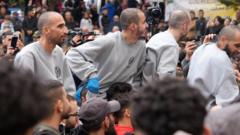**Festive scenes unfold in the West Bank as communities celebrate the release of Palestinian prisoners, highlighting the complexities of the ongoing Israeli-Palestinian conflict.**
**Historic Prisoner Swap Sparks Celebrations Across West Bank**

**Historic Prisoner Swap Sparks Celebrations Across West Bank**
**200 Palestinian prisoners reunited with families amid jubilation following an exchange for Israeli hostages.**
A significant event unfolded in the West Bank as 200 Palestinian prisoners celebrated their release in a jubilant atmosphere. This release was facilitated by Israel in exchange for four female soldiers taken hostage by Hamas during the conflict that erupted on October 7, 2023.
The mix of prisoners released varied, with over half having served life sentences for serious offenses, including multiple murders of Israeli civilians, while some had never faced formal charges. Following the release, about 70 of the most serious offenders were deported through Egypt to countries like Qatar and Turkey, while a smaller group was sent to Gaza. The majority, totaling over 120, were allowed to return to their homes in the West Bank and East Jerusalem.
According to the Israel Prison Service, the release involved the completion of necessary procedures and political approvals. As the freed individuals stepped off the buses, they were greeted with cheers, fireworks, and community celebrations at a local sports complex. Many prisoners, including Bakker Kwaawish, expressed overwhelming gratitude after spending years behind bars. Bakker, who had served over six years, shared his emotional response, saying, "Thank God! It's a great feeling, I can't describe this feeling!"
The youngest among those released was just 16, while the oldest was Mohammed al-Tous, aged 69, who had spent an impressive 39 years in custody. Some prisoners had been subject to long-term detention without legal charges under administrative orders, a controversial practice in the region.
The latest exchanges mark the second such agreement since the ceasefire that began on January 19, with the first swap involving three hostages and 90 Palestinian detainees. This time, celebrations were not only marked by families welcoming their loved ones but also by a show of political support from Fatah, the ruling party in the West Bank.
In tandem, the release of the four female Israeli soldiers by Hamas from Gaza underscored the ongoing tensions surrounding hostage situations. While the handover was carefully orchestrated, Israel's government has accused Hamas of violating ceasefire terms due to the absence of a missing civilian hostage during this exchange.
As both parties continue to navigate the complexities of their conflict, the emotional and social repercussions of such prisoner swaps remain deep and significant, contributing to the evolving narratives in the Israeli-Palestinian saga.






















